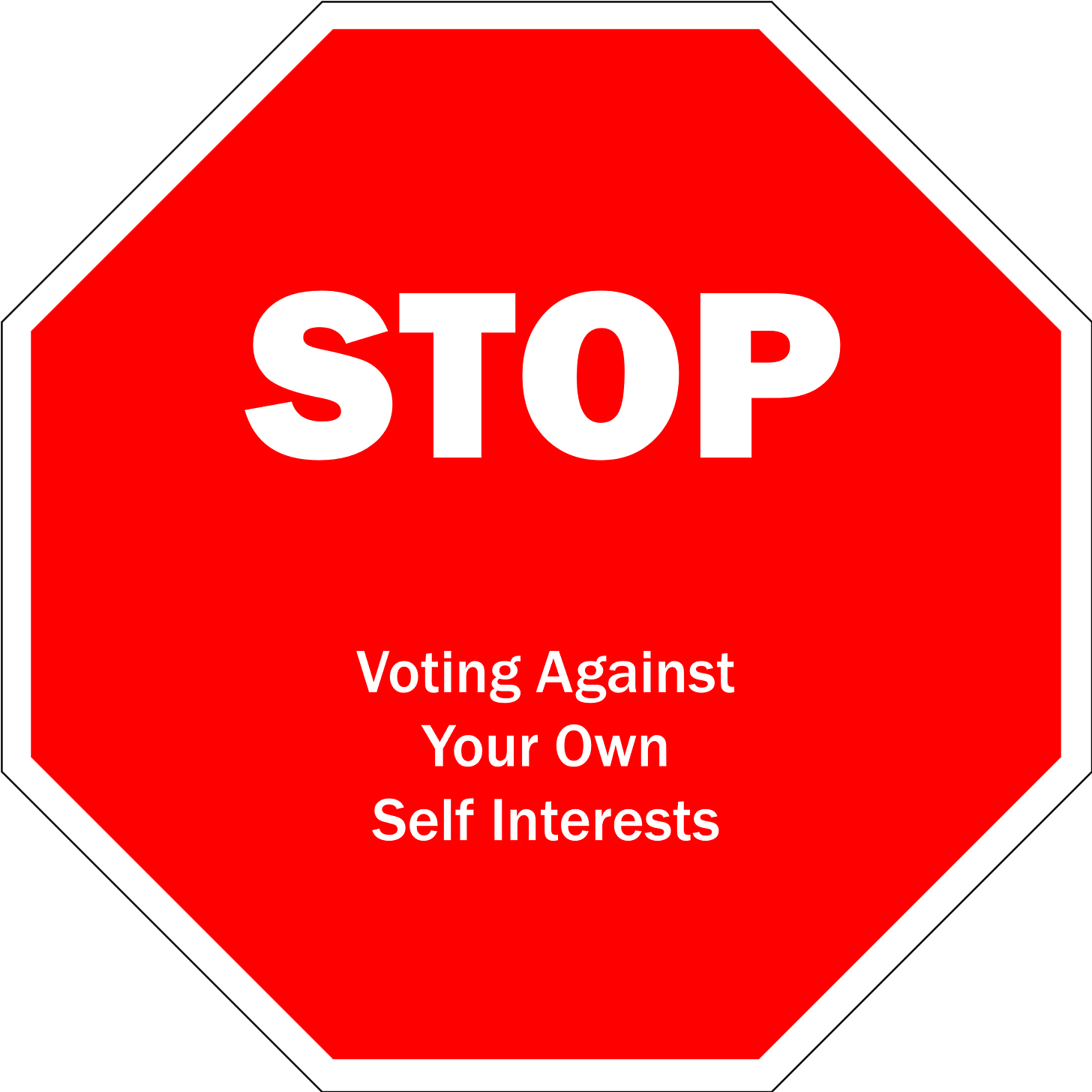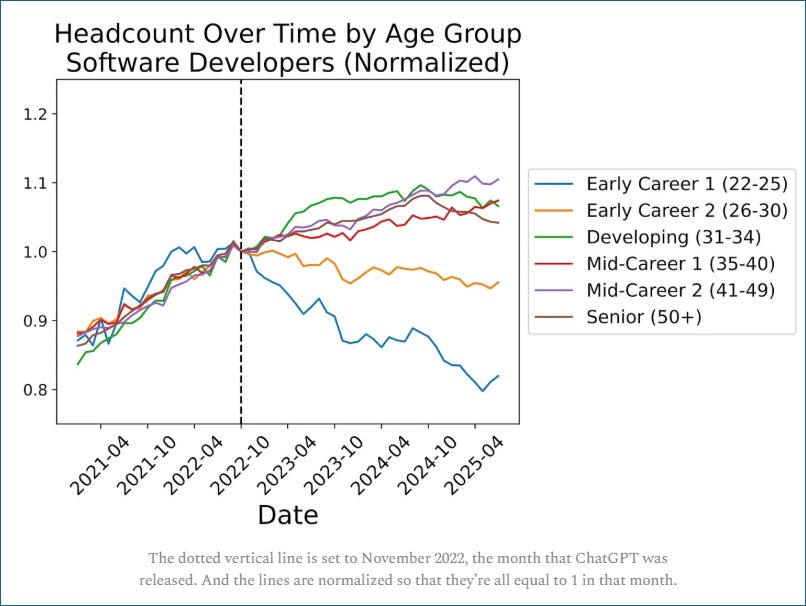AI Redux: I Need More Synonyms for "Idiot"
As usual, people are not thinking things through. Sigh.
We’ve discussed before that many people vote against their own self-interests. They make political decisions that directly harm them. And we know why. They’re stupid.
Which brings me to AI, which an incredible number of people are embracing. (You know who you are.)
Don’t get me wrong: there are some good uses for AI. They’re rare, but when they are good, they rock. For example, using AI to determine which sperm is the best swimmer for implantation in an egg as part of IVF. The AI plus robotic process decreases unviable embryos, and will eventually cost scads less than IVF costs now because it will be possible to undertake the procedure in a doctor’s office and not in an IVF center. I am not making this up.
But mostly, what AI is used for, and is PROJECTED to be used for involves much more mundane tasks. In so doing, it decreases people’s abilities, basic skills and creativity, as I’ve written about before:
Let's Talk AI
Artificial Intelligence (AI) is basically defined as the field of science concerned with building computers and machines that can reason, learn, and act in such a way that would normally require human intelligence or that involves data whose scale exceeds what humans can analyze.
But now, there’s something else.
Senator Bernie Sanders (I-VT) wrote an op-ed indicating that 100 MILLION jobs could be lost to AI over the next decade. That would include:
89% of fast food workers
65% of teaching assistants
47% of truck drivers
And it’s not just Senator Sanders. Some corporate types are saying the loss could be half of all white collar jobs. Link.
As an aside, there are some jobs that AI will never be able to replace. Top of the list? Plumbers. Try and get AI to fix an overflowing toilet at 2 a.m.
But back to the Senator’s list. Let’s start with 89% of fast food workers. In my generation, a lot, possibly the majority, of people had a job in fast food. The jobs were mentally boring and physically demanding, but you learned a lot. Show up on time, interact with customers in an upbeat fashion, follow instructions, learn to tolerate a relatively regimented organization. Things that actually served us well when we got out into “the real world” and secured “real jobs”.
There used to be a Wendy’s near my house, and I would go there with this order:
May I please have a plain hamburger, with nothing on it, not even a bun, it’s for my dog.
Because this particular Wendy’s outpost hired incompetent people, I normally was given a hamburger on a bun with mustard, and they ALWAYS asked if I wanted cheese1. Admittedly, AI and the robot will get the dog-burger-order correct on a regular basis. But I’d rather scrape off mustard then see all those people lose their jobs.
In addition, I’m wondering about the cost of fast food, once it’s robot-performed. Obviously, robots don’t get paid, so that’s a lot of savings in wages. Will the cost of a burger decrease, or will it stay where it is, so that the benefit of robots conveys to stockholders and owners? Also - what does it do to the Federal tax pool for Social Security and Medicare, since those dollars will no longer be subtracted from paychecks?
Not to mention the fact that robots don’t have “senses”. They cannot see nor smell. When humans work in fast food, they can tell if something went bad because of the smell. They can see mold growing on the milkshake machine that needs to be dealt with. What do robots do relative to preventing food poisoning?
We’ll move on to teaching assistants (TAs). Let’s be honest, TAs are people who made it through college and are now working on graduate degrees. They often grade papers and tutor students. Since students now use AI to research and write their papers, there isn’t much for the TAs to do anyway in that regard. College admissions are about to fall off a cliff, and a lot of that has nothing to do with AI. So this seems to be a thing independent of AI, which will only hasten the evisceration of higher learning.
Truck drivers? And also bus drivers and taxi drivers — lots of driverless vehicles. I understand the concept. But I want to understand - since there’s no robot in the driver’s seat — who physically puts the hose thing in the slot to recharge the vehicle?
So let’s say this all comes to pass. It’s obvious that the increased productivity and decreased costs will line the pockets of the rich. NO DOUBT.
Bu what happens to all the people who can no longer find jobs? How do they put roofs over their heads, and food on their tables? Will health care be free once the doctors, nurses, techs and the rest are all robots? It’s not like there would be the tax revenue to support guaranteed minimum income.
Working helps provide a “sense of self” - even if it wasn’t a money thing, a lot of people identify by the kind of work they do. A lot of people derive a sense of accomplishment from their careers.
What will those people DO all day if they’re not working?2 It’s not for a month, it could be years or (shudder) decades. Take one canary in a coal mine job, coding, and look at what’s happened to employment: Source.
And let’s not forget that AI doesn’t necessarily do what it’s supposed to do. As an example:
Deloitte Australia will partially refund the 440,000 Australian dollars ($290,000) paid by the Australian government for a report that was littered with apparent AI-generated errors, including a fabricated quote from a federal court judgment and references to nonexistent academic research papers. Source.
So my conclusion is that you have all these people with permanent time on their hands because there are no jobs for them, there is huge economic disruption to everyone except the rich, and AI will make a bunch of mistakes.
What could possibly go wrong?
True story - that Wendy’s ended up closing after only a year or two because of all the customer complaints that they put mustard on everything, even when they were asked not to.
In the interest of full disclosure, I plan to retire from my current tech job next year. That means I will be one of those “what will I do all day?” people. To prep for this, I’ve lined up a consulting gig, I’ll continue political coaching, I plan to donate time to the NGO of my choice, learn to make mosaics (I did my first one last month), swim, do yoga and tai chi, and yes, have more time for my Substack. But unlike the kids who can’t find jobs, I started my first part-time job in 1969, I’ve had 5 discrete careers, and at my age, I’m TIRED.




I start many business phone calls with ‘Are you a real person?’ Hmmm, sounds a bit rude. Might be good to rephrase that, but I find my nerves on edge with it all.